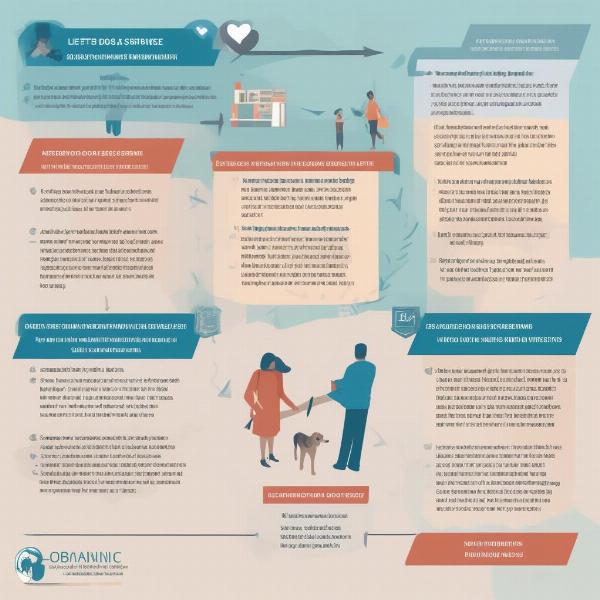Navigating the housing process with a service dog can seem daunting, but a well-crafted service dog letter can significantly simplify things. This guide provides comprehensive information on service dog letters for housing, covering everything from what they are to how to obtain one and use it effectively. We’ll address common questions and concerns, empowering you to confidently secure suitable housing with your loyal companion.
Understanding Service Dog Letters for Housing
A service dog letter for housing is an official document from a licensed mental health professional (LMHP) confirming your need for a service dog to alleviate a disability-related challenge. It plays a crucial role in demonstrating your rights under fair housing laws, which generally exempt service dogs from pet restrictions, including breed and weight limitations, and associated fees. This letter is your key to accessing housing that accommodates both you and your service dog.
Why is a Service Dog Letter Essential for Housing?
A service dog letter provides official documentation of your need for a service dog, which is crucial for several reasons:
- Legal Protection: It protects your rights under fair housing laws, enabling you to challenge discriminatory practices by landlords.
- Exemption from Pet Restrictions: It exempts your service dog from pet policies, such as breed and weight limits, pet fees, or pet deposits.
- Clear Communication: It clearly communicates your needs to your landlord, fostering understanding and cooperation.
- Peace of Mind: It offers you peace of mind, knowing you have the necessary documentation to secure suitable housing.
How to Obtain a Service Dog Letter for Housing
Obtaining a service dog letter involves consulting with a qualified LMHP. This could be a therapist, psychiatrist, psychologist, or other licensed professional specializing in your specific disability. They will assess your condition and determine if a service dog can genuinely mitigate your disability-related challenges. If so, they will issue a formal letter outlining your need for the dog.
Be prepared to discuss your disability, its impact on your daily life, and how a service dog would specifically alleviate those challenges. Open and honest communication with your LMHP is vital in this process.
 Steps to Obtain a Service Dog Letter
Steps to Obtain a Service Dog Letter
Using Your Service Dog Letter Effectively
Once you have your service dog letter, present it to your potential landlord or property manager. It’s best to provide the letter upfront during the application process to avoid any misunderstandings. Be prepared to answer any reasonable questions they may have about your service dog’s tasks and training. However, be aware that they are not legally permitted to inquire about the specifics of your disability.
Remember, your service dog letter is a confidential document. Ensure it’s handled with discretion and only shared with relevant parties. Keep a copy for your records.
What if My Landlord Refuses to Accept My Service Dog Letter?
While landlords are generally required to accommodate service dogs, there may be rare exceptions. If your landlord refuses to accept your legitimate service dog letter, consult with a disability rights organization or an attorney specializing in fair housing law. They can advise you on the best course of action and help you assert your rights.
Conclusion: Securing Your Home with Your Service Dog
A service dog letter for housing is a vital tool in ensuring you can find and secure housing that accommodates your needs and the needs of your service dog. By understanding the process of obtaining and using this letter, you can confidently navigate the housing market and create a welcoming home for yourself and your loyal companion.
FAQ
- Do I need a specific breed of dog for it to qualify as a service dog? No, any breed can be a service dog. The key factor is the dog’s training and ability to perform specific tasks related to your disability.
- Does my service dog need to wear a vest or identification? While not legally required, a vest or ID can be helpful in identifying your dog as a working animal.
- Can my landlord ask for proof of my dog’s training? Yes, they can request reasonable proof of training, such as documentation from a training program.
- What if my service dog causes damage to the property? You are responsible for any damage caused by your service dog, just as you would be for any damage you caused yourself.
- Can my landlord charge me extra for having a service dog? No, landlords are generally prohibited from charging additional fees or deposits for service dogs.
- Can my landlord restrict my service dog’s access to certain areas of the property? Generally, no, unless the area poses a direct threat to the dog’s health or safety.
- Where can I find more information about service dog laws and housing? Contact a disability rights organization or a fair housing agency in your area.
Related Articles:
- service dog letter template
- psychiatric service dog letter
- register dog as emotional support dog
- emotional service dog tags
About ILM Dog:
ILM Dog provides comprehensive resources and expert advice on all aspects of dog care, from breed selection and health to training, nutrition, and grooming. Our mission is to empower dog owners worldwide with the knowledge they need to provide the best possible care for their furry companions. Whether you’re a first-time dog owner or a seasoned expert, ILM Dog offers valuable insights and practical tips to help you navigate the joys and challenges of dog ownership. For further assistance, contact us at [email protected] or call +44 20-3965-8624.